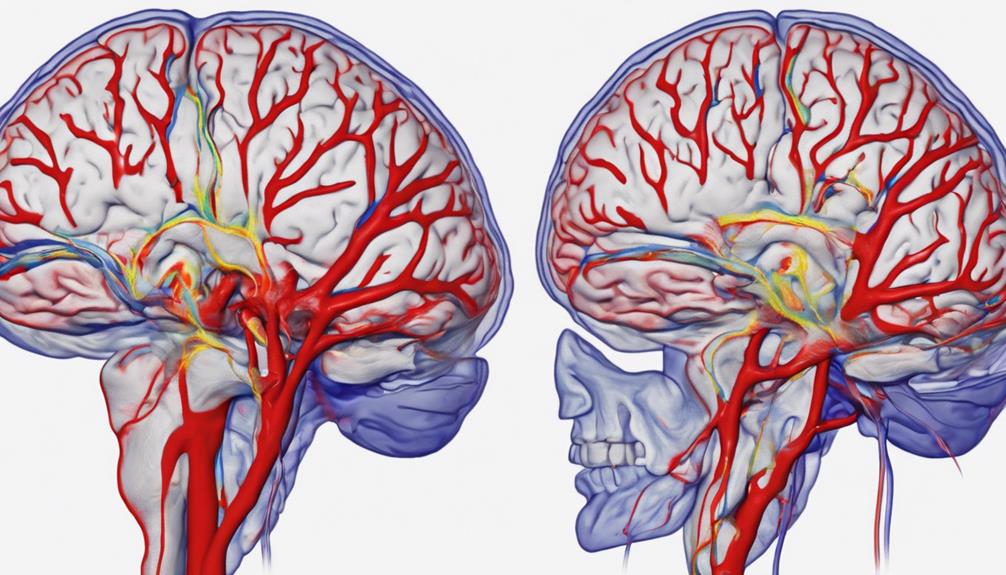Let’s explore the complex world of ICD-10 codes related to Vascular Dementia, shining a light on the involved intricacies.
As we navigate the labyrinth of diagnostic criteria and treatment modalities, a deeper understanding emerges of how this condition impacts patient care and healthcare providers alike.
The nuances of coding for Vascular Dementia demand precision and insight, influencing not just medical records but also the trajectory of patient management.
The interplay between vascular health and cognitive decline beckons us to explore further, uncovering the crucial role of accurate coding in unraveling the mysteries of this condition.
Key Takeaways
- Vascular Dementia ICD-10 code: F01 from brain infarction.
- Proper sequencing: etiology before manifestation.
- Symptoms: memory loss, reasoning difficulties, mood changes.
- Treatment: manage risk factors, cognitive therapy, caregiver support.
Overview of Vascular Dementia in ICD-10
Vascular Dementia in ICD-10, represented by code F01, is a form of dementia resulting from brain infarction. This condition is associated with memory decline and a deterioration in cognitive function due to the blockage of blood supply to the brain.
Within the ICD-10-CM coding convention, it's crucial to sequence the underlying physiological condition before the manifestation. In the case of Vascular Dementia, proper sequencing involves coding the etiology, such as arteriosclerotic dementia or multi-infarct dementia, followed by the manifestation. These manifestation codes are integral to the etiology/manifestation convention, aiding in accurate diagnosis and treatment planning.
Vascular Dementia predominantly affects adult patients aged between 15 and 124 years. Understanding the specific nature of this dementia and adhering to the correct sequencing order for ICD-10-CM coding is essential in providing comprehensive care and support to individuals experiencing the challenges posed by Vascular Dementia.
Symptoms and Clinical Presentation

Upon observing individuals with vascular dementia, notable symptoms and clinical presentations manifest through distinct cognitive and behavioral changes. Memory loss is a common early sign, often accompanied by cognitive decline, including reasoning difficulties. This decline typically occurs in a step-wise fashion due to the cumulative effect of small strokes affecting different areas of the brain.
Alongside cognitive symptoms, individuals may exhibit behavior changes such as sudden mood disturbances. The clinical presentation of vascular dementia can also involve physical symptoms like gait disturbances, weakness, or other signs of neurological damage. The variability in symptoms correlates with the location and extent of brain damage caused by vascular disease.
Understanding these diverse manifestations is crucial for healthcare providers to recognize and address the complex needs of individuals with vascular dementia effectively. By identifying and evaluating these symptoms comprehensively, healthcare professionals can provide targeted interventions to improve the quality of life for those affected by this condition.
Diagnostic Criteria for Vascular Dementia
When diagnosing vascular dementia, healthcare professionals must consider specific criteria that encompass cognitive decline and its correlation with vascular disorders leading to brain infarction.
Vascular dementia, coded as F01 in the ICD-10-CM, stems from a vascular disorder that obstructs blood supply to the brain. The diagnosis necessitates coding the underlying physiological condition responsible for brain infarction. It's imperative to adhere to proper ICD-10-CM coding guidelines, which dictate sequencing the underlying condition before the manifestation of vascular dementia symptoms.
Clinical presentation often includes a noticeable decline in memory and cognitive function. Understanding the relationship between blood supply disruption and cognitive impairments is crucial in diagnosing vascular dementia accurately. Healthcare providers must carefully evaluate the patient's medical history, symptoms, and diagnostic test results to make an informed diagnosis.
Treatment Approaches for Vascular Dementia

Considering the impact of vascular disorders on cognitive function, the treatment approaches for vascular dementia primarily focus on managing risk factors and implementing therapies to enhance cognitive abilities and slow down disease progression.
- Managing Risk Factors: Addressing conditions like hypertension and diabetes is crucial to prevent further brain damage in individuals with vascular dementia.
- Cognitive Stimulation Therapy and Memory Aids: Utilizing cognitive stimulation therapy and memory aids can help improve cognitive function and delay the progression of vascular dementia.
- Physical Exercise and Medications: Incorporating physical exercise into daily routines and prescribing medications such as cholinesterase inhibitors and memantine can assist in managing symptoms like memory loss and confusion in patients with vascular dementia.
In addition to these interventions, providing caregiver support, behavioral interventions, and establishing a structured routine are essential for enhancing the quality of life for individuals with vascular dementia. Continuous monitoring by healthcare professionals is vital to adjust treatment plans and offer necessary support to those affected by this condition.
Classification of Vascular Dementia in ICD-10
The classification of Vascular Dementia in ICD-10 categorizes it as F01, specifically designated for dementia resulting from brain infarction. Vascular Dementia encompasses physiological conditions like arteriosclerotic dementia and multi-infarct dementia due to brain infarction.
Proper coding of vascular dementia necessitates accurate sequencing, with the underlying physiological condition being coded before the manifestation of vascular dementia. The ICD-10-CM code F01.50 includes vascular dementia NOS and annotations for related codes, aiding in precise coding for vascular dementia diagnoses.
Understanding the nuances of coding for vascular dementia is crucial for healthcare providers to ensure appropriate billing and documentation. By following the guidelines provided in the ICD-10-CM, healthcare professionals can accurately capture and classify cases of vascular dementia, leading to improved patient care and effective management strategies.
Proper coding practices contribute to the comprehensive treatment and monitoring of individuals affected by vascular dementia.
Frequently Asked Questions
What Is the ICD-10 Code for Vascular Dementia 2023?
We can provide the ICD-10 code for vascular dementia in 2023. It's F01.50, applied to adult patients aged 15-124 years. This code encompasses major neurocognitive disorders due to vascular disease and vascular dementia NOS.
It's vital to note that the code F01.50 is non-billable and non-specific, effective starting October 1, 2023. Vascular dementia results from brain blood supply blockages, leading to cognitive decline. Proper coding sequencing requires identifying the underlying physiological condition before the manifestation.
How Do You Code Vascular Dementia?
When coding Vascular Dementia, we prioritize accuracy by sequencing the underlying condition before its manifestations. Proper documentation is key to ensure the correct ICD-10-CM code, F01, is applied.
Utilizing additional codes to specify etiology and manifestations is crucial. Clinical symptoms like memory and cognitive decline warrant attention.
Our approach guarantees precise reporting and effective communication of the patient's condition.
What Is the ICD-10 Code for Vascular Dementia Without Behavior?
When coding vascular dementia without behavior, the applicable ICD-10 code is F01.50. This code covers adult patients aged 15-124 years and includes conditions like major neurocognitive disorder due to vascular disease and vascular dementia NOS.
Proper sequencing of underlying conditions is essential for accurate medical coding. It's crucial to ensure the correct code is applied to reflect the patient's condition accurately and facilitate proper treatment and care.
What Is the ICD-10 Code for Mixed Vascular Dementia?
The ICD-10 code for mixed vascular dementia is F01.51. This code, effective from October 1, 2023, includes behavioral disturbances. It helps in accurately coding cases of vascular dementia with behavioral issues.
The American version of F01.51 differs from international versions. While it isn't for reimbursement currently due to a lack of detail in other codes, it plays a crucial role in specifying mixed vascular dementia cases for proper medical documentation.
Conclusion
In conclusion, coding for Vascular Dementia in the ICD-10 system is essential for accurately documenting and billing for this condition. Understanding the underlying physiological condition and sequencing it properly is crucial for effective management.
Just as a compass guides a ship through turbulent waters, precise coding ensures the right path for diagnosing and treating Vascular Dementia.










